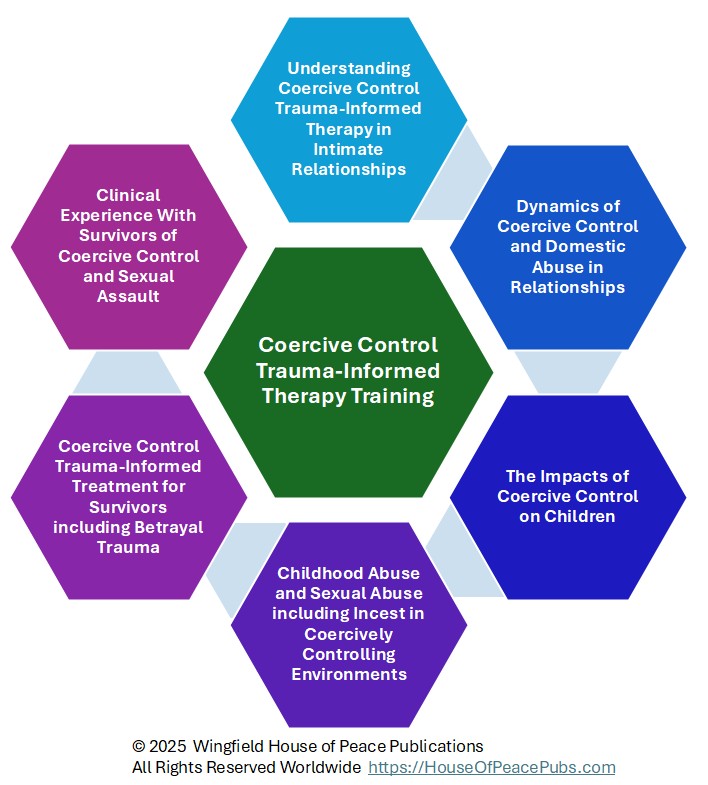
Why Coercive Control Trauma-Informed Therapy Training Matters
Category: Advocacy Training, Child Custody, Coercive Control Trauma-Informed, Domestic Abuse, Trauma Issues
By Dr. Debra Wingfield
Coercive control is a pattern of domination, humiliation, surveillance, oppression, and other non-physical tactics. These tactics strip away a person’s autonomy, safety, and sense of self—often without leaving a single visible bruise. Yet it’s impact is profound and endures.
Professionals who provide trauma-informed services, such as, therapy, advocacy, family court and legal services, or child welfare support must understand the nuanced and deeply destructive nature of coercive control.
Specialized education and clinical insights cover ethical, trauma-informed care and effective support for survivors. This is critical for their families as well. In my 50+ years of experience as a therapist and coercive control and domestic abuse educator, I recommend these hours as minimal requirements to provide trauma-informed therapy to survivors and children. These courses are offered through House of Peace Publications.
Coercive Control Trauma-Informed Therapy Training Courses
Dynamics of Coercive Control and Domestic Abuse in Relationships
Suggested Training: 14–28 hours
These advanced courses explore the full spectrum of abusive dynamics in relationships. Topics include:
– Non-physical abuse identification
– Entrapment control dynamics
– Legal implications
– Reproductive coercion and sexual assault
– Trauma-informed responses that respect autonomy
The Impact of Coercive Control on Children: A Trauma-Informed Lens
Suggested Training: 7–14 hours
Children exposed to coercive control may experience:
– Chronic anxiety
– PTSD
– Attachment disruptions
Be equipped as a professional to assess and intervene in ways that support safe, secure parent-child relationships.
Childhood Abuse and Sexual Abuse in Coercively Control Environments
Suggested Training: 7–14 hours
When child abuse, sexual abuse, and incest occur in coercive control environments, trauma becomes even more complex. This course helps professionals address:
– Fragmented identities
– Pervasive shame
– Long-term relational trauma
Understand Coercive Control Trauma-Informed Therapy in Intimate Relationships
Suggested Training: 7–14 hours
Coercive control is more than verbal or emotional abuse—it is a deliberate strategy to dominate and disempower through gaslighting, surveillance, economic control, isolation, and other harmful tactics. Professionals must learn to:
– Recognize early signs
– Accurately assess safety risks
– Engage in survivor-centered, non-collusive interventions
Trauma-Informed Treatment for Survivors of Coercive Control and Betrayal Trauma
Suggested Training: 7–14 hours
Therapists must understand that betrayal trauma—when a trusted person is also the source of harm—requires a shift in treatment approach. This course focuses on:
– Safety and healthy boundaries
– Rebuilding self-trust and identity
– Post-traumatic growth strategies
Benefits of Trauma-Informed Clinical Experience with Coercive Control
and Sexual Assault Survivors
Drawing on years of work with survivors of coercive control and sexual assault, I have seen how trauma-informed care—grounded in empathy, education, and ethics—empowers survivors to reclaim their lives.
Support Trauma Recovery Toward Functional Independence
The goal of trauma recovery is short term therapy aimed towards restored autonomy. Survivors thrive when they can:
– Make choices without fear
– Reconnect with their identity
– Engage in supportive, non-controlling relationships
Address the Link Between Childhood Abuse and Adult Coercive Relationships
Many survivors repeat patterns of abuse rooted in unresolved childhood trauma. Become a specialized trained professional to help:
– Identify generational cycles
– Intervene in ways that break them
Recognize the Use of Children as Tools of Control
Post-separation, abusers often use children to:
– Manipulate custody
– Spread false narratives
– Instill fear in protective parents
Trained professionals learn to identify and respond to these tactics to protect children’s safety and stability.
Help Children Thrive with both Parents After Abuse
Court-mandated contact with a coercive parent can cause severe emotional harm to children. Trauma-informed practitioners can:
– Support safe, stable, nurturing parents
– Advocate for environments that heal
Combat Manipulation and Distorted Thought Patterns in Co-Parents
Coercive parents often distort truth and manipulate children to interfere with the safe parent-child relationship. Discover:
– Tools to recognize Child and Mother Sabotage
– Techniques to support emotional health
– Approaches to reinforce truth-telling
Work With Divorced or Separated Parents Around Child Well-being
Coercive control often continues through legal avenues post-divorce. Professionals must:
– Remain vigilant
– Work collaboratively across systems
– Prioritize children’s safety stable, nurturing parent’s.
Final Thoughts
Coercive control may leave no bruises, but its psychological, relational, and developmental impacts are profound.
Specialized trauma-informed trained, clinical supervision, and lived experience are essential to prevent further harm.
Mental health and Court professionals have an ethical responsibility to be trained in:
– Coercive control dynamics
– Trauma recovery
– Safe, effective therapy interventions
Without this knowledge, survivors may endure ineffective therapy or court intervention—or worse, re-traumatization, which leads them to abandon treatment and professional support altogether.
References
1. Stark, E. (2007). Coercive Control: The Entrapment of Women in Personal Life. Oxford University Press.
2. Stark, E. (2023). Children of Coercive Control. Oxford University Press.
3. Steinke, H. R., & Meshelemiah, J. C. A. (2025). Between a Rock and a Hard Place. Studies in Clinical Social Work. https://doi.org/10.1080/28376811.2025.2525416
4. Katz, E. (2022). Coercive Control in Children’s and Mothers’ Lives. Oxford University Press
Ready to Begin Your Training?
We offer these expert-led trainings below. 😊
Visit: https://houseofpeacepubs.com/wordpress/advocacy-training/ 🔗
Mention this blog post for special pricing! 📌
For more information, or if you have any questions, please contact us at: info@houseofpeacepubs.com. 📩
About the Author

Dr. Debra Wingfield
With over 50 years of experience, Dr. Wingfield has trained psychotherapists, advocates, court professionals, and students on:
– Coercive control
– Domestic violence
– Trauma-informed therapy
– Addiction and abuse treatment
She is the author of:
– Eyes Wide Open: Help! with Control Freak Co-Parents
– From Darkness to Light: Your Inner Journey
– Through a Child’s Voice: Transformational Journaling
